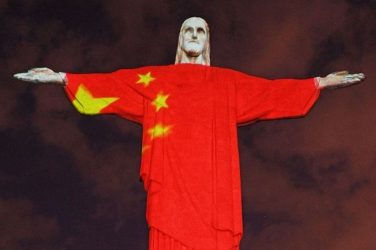Former visiting professor at Stanford University, Fernando Henrique Cardoso,
was back at that Northern California school for one more lecture. Speaking to a
standing only auditorium the Brazilian President talked about the art of politics, the need
to renew representative democracy all over the world and the hard struggle to
correct the social imbalances in Brazil.
During a recent brief stop in San Francisco on his way to a visit to Japan, Brazilian Presi-dent Fernando
Henrique Cardoso announced the endowment of a chair in Brazilian studies. The announcement was made to a standing room
only audience at Stanford’s Dinkelspiel Auditorium on March 11.
The chair, which will allow Stanford to bring a distinguished scholar of Brazil to campus each year, is funded by a
$1 million gift from the New York branch of Safra National Bank of Brazil. It has been in the planning stages since
Brazilian officials came here in the summer of 1994 to watch the Brazilian soccer team play in World Cup competition.
Stanford’s connections to Brazil go back to its second president, John Casper Branner, and include the most extensive US
research library collection on Brazil.
Cardoso, 64, who was a visiting professor
of political science at Stanford in 1977 when Brazil was run by a
military dictatorship, used his brief visit to the campus to “praise
the art of politics” and defend elected politicians at a time when, he
said, the public seems to hold them in low regard. The lecture fund
provides the Institute for International Studies with support for an
annual public address by a prominent scholar or practicing professional
in the field of international relations.
Today’s politicians face a greater demand for accountability than their predecessors because of the breakdown
of integrated political parties or lasting coalitions, Cardoso said during his lecture. Voters, he said, no longer can be
neatly defined as holding views on the right or the left, and so demand more accountability from politicians than they did
when political ideology was a more unifying force.
Successful politicians also must work
harder today to build a consensus and to “create space” for grassroots
groups that are not formally represented by political parties, said the
veteran senator who was elected president last year. Saying he was
“proud to be a politician,” the man who has forged two political
parties in the past spoke of modern political leadership as
approximating Octavio Paz’s definition of history “a daily invention, a
continual creation; a hypothesis, a risky game, a wager against the
unforeseeable. Not a science, but rather knowledge, not a technical
skill, but rather an art.”
Restoration of democracy in Brazil,
Cardoso said, has been “nothing but a first step, one that is
necessary, but in and of itself insufficient if we are to correct the
serious social imbalances of our society.” The problems, he said, are
not confined to Brazil. “Representative democracy has shown a need for
renewal in every country where it has been adopted,” he said.
“Democratic systems face problems such as the citizenry’s growing lack
of interest in politics, low voter turnout during elections and, even
more seriously, a growing degree of hostility on the part of voters
with regard to politicians.”
National legislatures, he said, “are the natural locus for the continual consensus-building which is the requirement
if we are to move forward while simultaneously safeguarding the values most dear to our sense of nationality, the
values without which no nation can recognize itself.”
Cardoso must negotiate with 18 political parties in an effort to broaden consensus in Brazil. “Furthermore, it is
essential that the public realm be enlarged so as to increasingly encompass those who are voiceless today,” he said. While the
church and other institutions have played this role in the past, he said, it is no longer enough. An effective leader “has to
symbolize something beyond what is being debated at the time by normal political organizations.”
The pace of government action, he said, is unfairly characterized as “gridlock and inefficiency, whereas the truth
is that the congress’s schedule is overloaded with highly complex issues.” Politicians are struggling with the reality
that countries have become more diverse economically and politically, he said, and can no longer divide their constituents
into two main classes: the bourgeoisie and the proletariat.
“Individuals and groups are no longer
defined by the roles they play in social relations of production, but
primarily by their regional, racial, cultural or religious identities,”
he said. As a result, politicians are held accountable to more groups
with more narrow social demands.
“In sum, we are experiencing the
fragmentation of society into groups or ghettos. This has led to a
simplification in a way, since only the market or mass culture is left
to unite citizens in forging a national identity. Both the values that
formed the glue that held national societies together and the values
that guided the relations within them are fading away.”
Cardoso said improving the political
system requires attention to the role of the media, but that
“representative democracy depends on solid and strong institutions,
whose pace is of necessity slower than the flow of information.”
“I acknowledge the important role played by the press in fighting authoritarianism in Latin America,” he said, “but
the press needs to move beyond an ‘adversarial’ attitude to play a constructive role as well.”
As Cardoso left Dinkelspiel Auditorium, a protester with a bullhorn criticized his support for building highways in
the Amazon rainforest.
The Stanford connection In his introduction of Cardoso, President Gerhard Casper said that Stanford’s
connection with Brazil began before the university was founded in 1891. John Casper Branner, who became Stanford’s first
professor of geology and its second president, was a Cornell University student in 1874 when he met Emperor Dom Pedro II in
Brazil. Together they founded the Geological Commission of the Brazilian Empire. Branner stayed in Brazil until 1880
and returned five times.


